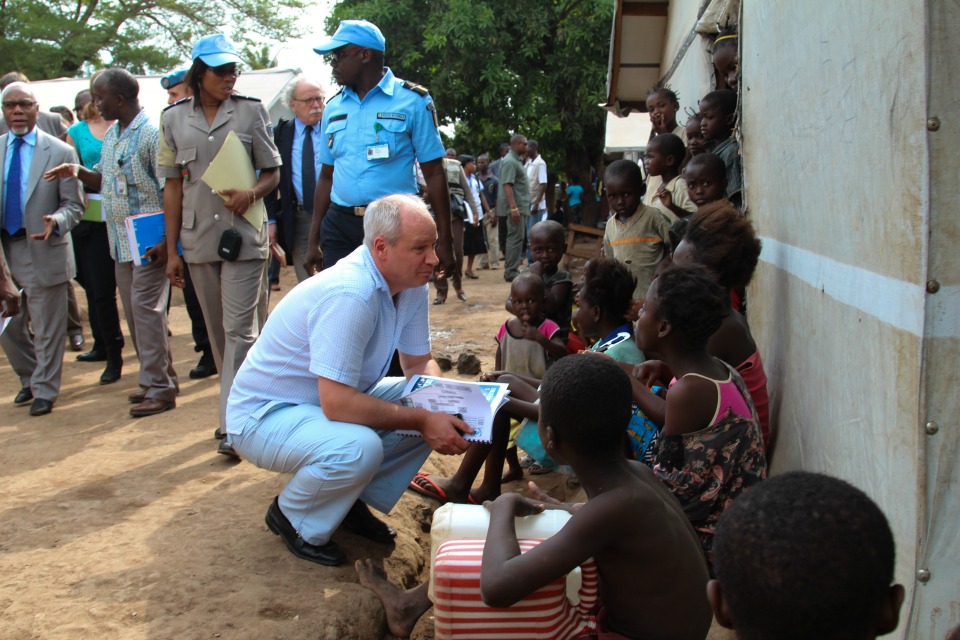The visit of the Security Council to the Central African Republic, Burundi and the African Union
Statement by Ambassador Peter Wilson of the UK Mission to the UN at the Security Council Wrap-Up Session for March

Thank you Mr President.
Let me begin by condemning the Al Shabaab attack this weekend in Mogadishu. Our colleague, Ambassador Yousef Bari-Bari, Somalia’s Permanent Representative to the United Nations in Geneva was among those killed. Ambassador Yousef will be remembered as someone who worked tirelessly at the Human Rights Council to improve the lives of others. I offer our heartfelt condolences to the people and Government of Somalia. These senseless attacks will not dent this Council’s resolve to support the people of Somalia.
Mr President, We thank you and your mission for the energy and leadership shown during this month’s Presidency. We welcome that this session is again being held in public. We covered a huge amount in March and others during this debate have enumerated the numerous aspects on the agenda so I want to focus on our preventative work. We welcome the concrete actions on children and armed conflict proposed in the open debate last week. And we support the continued strengthening of our relationship with regional and sub-regional organisations as seen by our visit to Addis and by the first visit to the UN by the new European Union High Representative.
Mr President, I wanted to focus in particular on the visit of the Security Council to the Central African Republic, Burundi and the African Union. It’s good for the Council to travel, and making it happen takes a huge amount of work both by the Presidency and by the Secretariat. I will touch on three areas in particular: firstly the importance of effective and efficient peacekeeping, secondly the significance of up-coming elections and thirdly the value of strong and flexible models for regional co-operation.
First, peacekeeping. During our visit to the Central African Republic, the potential of that country was clear for everybody to see - hardworking people and significant natural resources. The problem is how we ensure the necessary security for development to take hold. We welcome the role that MINUSCA has played in delivering this security in conjunction with Sangaris and EUFOR. The increase of the MINUSCA troop ceiling this month is another welcome step forward to meet the substantial protection of civilians challenge in the Central African Republic, particularly as EUFOR draws down. But as we look ahead to the Peace Operations Review later this year, we must also think about how we can empower and incentivise host governments to embed security so that missions can responsibly draw down when the time is right. As our debate on Haiti this month showed, clear planning for the transition away from peacekeeping is vital for security gains to become sustainable.
Part of that transition process brings me to my second point, holding free and fair elections. This is particularly relevant this year. In Africa alone there will be 11 Presidential and Parliamentary elections in 2015. And as we saw on our visit, Burundi’s election in June is an important opportunity to showcase how far that country has progressed under Arusha in the last 20 years. There is much to celebrate in that progress, including the increased contribution made by Burundian peacekeepers. Over 1,200 are deployed, including in the Central African Republic. But we are concerned by plans for a Presidential third term. This would risk undermining the stability that President Nkurunziza has done so much to bring about. I’m pleased that so many members of this Council made this clear in our meeting with him.
Finally on regional cooperation, let me turn to our consultations with the African Union in Addis. We welcome these regular consultations and we are keen to make future discussions as focused and interactive as possible. As the Permanent Representative of Chad has said, limiting the agenda to fewer items and concentrating on the urgent issues would provide greater value to our meetings. As we heard from the European Union High Representative, regional and sub-regional groups such as the EU and AU will play a vital role working with the United Nations in the future. So we support more focused contact to help us achieve that goal.
Mr President, Let me close on a sombre note. This month marked the fourth anniversary of the start of the crisis in Syria. The continued suffering of those in Syria and the region is a direct consequence of Assad’s refusal to give all Syrian people a voice, his failure to preserve security and his unwillingness to co-operate with the region. We must be mindful of the lessons learnt from Syria - particularly that those who cling to power without thinking of their people undermine stability, rather than strengthening it.
Thank you Mr President.